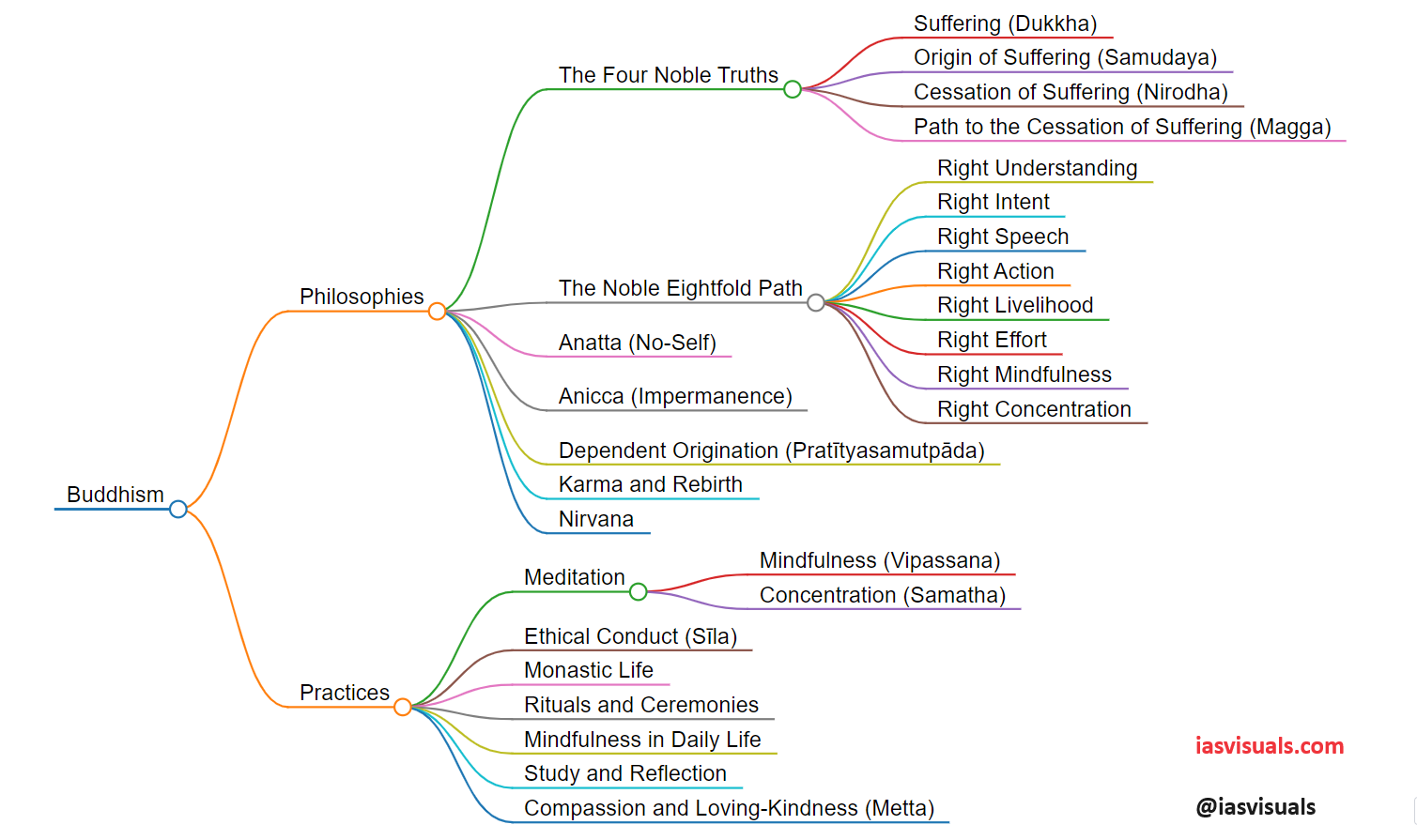Buddhism, founded by Siddhartha Gautama (the Buddha) in the 5th or 6th century BCE, encompasses a wide array of philosophies and practices, which can vary significantly among its different schools. However, there are core principles and practices that are fundamental to most traditions within Buddhism.
Philosophies of Buddhism
The Four Noble Truths:
– The truth of suffering (Dukkha) : Recognizes that existence is characterized by suffering.
– The truth of the origin of suffering (Samudaya) : Suffering is caused by desire and attachment.
– The truth of the cessation of suffering (Nirodha) : It’s possible to end suffering by eliminating desire and attachment.
– The truth of the path to the cessation of suffering (Magga) : Following the Eightfold Path can lead to the end of suffering.
The Noble Eightfold Path:
A guide to behavior, thought, and meditation practices aimed at ending suffering. It includes Right Understanding, Right Intent, Right Speech, Right Action, Right Livelihood, Right Effort, Right Mindfulness, and Right Concentration.
The concept of Anatta (No-Self):
Buddhism posits that there is no permanent, unchanging self or soul in living beings.
The concept of Anicca (Impermanence):
Everything in existence is transient, constantly changing, and impermanent.
The concept of Dependent Origination (Pratītyasamutpāda):
This principle asserts that all phenomena arise in dependence upon other phenomena; nothing exists in isolation.
Karma and Rebirth:
Actions have consequences that extend into future rebirths, and the cycle of birth, death, and rebirth (samsara) is driven by karma.
Nirvana:
The ultimate goal of Buddhism, representing the cessation of suffering and liberation from the cycle of rebirth. It is achieved by extinguishing desire, aversion, and delusion.
Practices of Buddhism
1. Meditation :
– Mindfulness (Vipassana) : Focusing on the present moment and developing an awareness of thoughts, feelings, and sensations without attachment.
– Concentration (Samatha) : Developing deep concentration through focus on a single object or thought, leading to a calm and concentrated state of mind.
2. Ethical Conduct (Sīla) :
Adherence to ethical precepts, including not harming living beings, not stealing, not engaging in sexual misconduct, not lying, and not taking intoxicants.
3. Monastic Life :
Many Buddhists, particularly in Theravada traditions, pursue a monastic life to dedicate themselves fully to spiritual development.
4. Rituals and Ceremonies :
Including chanting, prayer, and various ceremonies throughout the Buddhist calendar, varying significantly among different cultures and traditions.
5. Mindfulness in Daily Life :
Integrating mindfulness into everyday activities to maintain a constant awareness and presence of mind.
6. Study and Reflection :
Engaging with the Buddhist scriptures (sutras), teachings (dhamma), and commentaries to deepen understanding and application of Buddhist principles.
7. Compassion and Loving-Kindness (Metta) :
Practices aimed at developing compassion towards oneself and others, often through meditation focused on loving-kindness.
The diversity within Buddhism has led to the development of many distinct schools and sects, each with its own interpretations and emphasis on different aspects of these teachings and practices. The major branches include Theravada, Mahayana, and Vajrayana (Tibetan Buddhism), each offering a unique path towards enlightenment.


Send